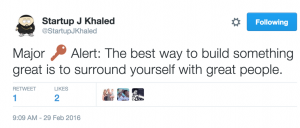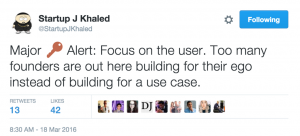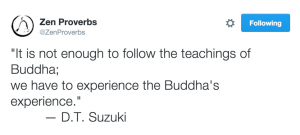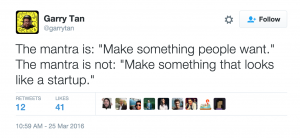When I was first getting into entrepreneurship, I asked Mark Cuban what he read or studied to learn how to start and build businesses. His response:
“Experience. It’s the only reliable teacher I’ve ever had. No books ever captured what it’s really like. You just gotta do it.”
Mark’s smarter than me on most things, but on this, I think he’s wrong.
Sort of.
Yes, experience is crucial, of course. And yes, most of the reading on entrepreneurship is pretty worthless. The problem is, without any instruction, you don’t know where to start or what to focus on.
After investing in 80+ companies and starting several of my own (and reading nearly everything there is about entrepreneurship), I think there’s a clear method to doing entrepreneurship right, AND I also think there are a few things you can read that can teach you that method.
Reading is NEVER a replacement for doing, but reading can be how you figure out where to start, and what the beginning should be like.
I’m going to tell you what those entrepreneurship lessons are, and precisely where you can read them.
The Only Entrepreneurship Lesson You Need (In Three Parts)
Paul Graham sums it up perfectly:
You need three things to create a successful startup: to start with good people, to make something customers actually want, and to spend as little money as possible. Most startups that fail do it because they fail at one of these. A startup that does all three will probably succeed.
I can’t say it any better than that. Lemme break down each three:
-
Start With Great People:

So many people skip over this, and I can see why–it’s hard to understand how crucially important people are to business until you’ve tried to build one with bad people.
The difference between a good co-founder and an average co-founder is the difference between chicken salad and chicken shit. I have experienced this many times in my life; in fact, there’ve been times where I was the average (or bad) co-founder, and I ruined a great idea.
So what are you looking for in a great co-founder (or founding team)?
Basically, your core founding team must be people who get shit done.
Paul Graham likes to talk about it in terms of finding people who are resourceful and determined. Sounds simple to understand, and it is. But not super easy to find those people. Most people say they are like that. The reality is that they WANT to be like that, but aren’t.
How do you tell if someone is resourceful and determined? Pretty easy actually: just look at what they’ve done in their life that showed resourcefulness and determination. Past behavior is a great predictor of future behavior.
No matter who you are and where you start in life, you can display those attributes. If you start poor and disenfranchised, you have a ton of opportunities to show them; basically, your whole life is using determination to overcome obstacles with few resources.
If you start rich and privileged, you can show these attributes as well, just in different ways. For example, by learning a lot of new things, by taking advantage of the opportunities in front of you, and by creating things from those resources you have.
The people who have shown these traits PRIOR to working with you are the people you want to build things with.
[Once you have product-market fit, then the emotional intelligence of the leaders, as much as the resourcefulness of the team, is what impacts success. NOTE: I’ll talk about this in a later post, we literally just went through this in our company.]
-
Make Something People Want:

The most common mistake I see from founders is that they think they need a great idea. This is completely wrong.
Ideas aren’t worth shit. And “great ideas” are usually worth even less. Why? Because startups are not about ideas. They’re about solving problems.
Sear this into your brain: A startup’s only purpose is to find a commercially viable solution to a real human problem.
This is what “make something people want” actually means. Paul Graham frames it like this:
“I like to find (a) simple solutions (b) to overlooked problems (c) that actually need to be solved, and (d) deliver them as informally as possible, (e) starting with a very crude version 1, then (f) iterating rapidly.”
Marc Andreessen put it in the most succinct way: “The only thing that matters is getting to product-market fit.”
What is product-market fit? Andreessen says:
“Product/market fit means being in a good market with a product that can satisfy that market…The life of any startup can be divided into two parts – before product/market fit and after product-market fit…When you are before product-market fit, focus obsessively on getting to product-market fit. Do whatever is required to get to product/market fit. Including changing out people, rewriting your product, moving into a different market, telling customers no when you don’t want to, telling customers yes when you don’t want to, raising that fourth round of highly dilutive venture capital — whatever is required.”
You don’t have a business until you have a sustainable and repeatable model for bringing in users and turning them into active (paying) customers, and the only real way to do this is to make something people want.
Make sure you fall in love with solving a problem, and not your idea or your solution. Because if you care about solving the problem, then you can keep trying things until you…make something people want.
There’s NEVER been a better time in history to start a company. You just can’t make it more complicated than it is: Start with a real problem first, then keep trying solutions until you have made something people want, as evidenced by people using (and buying) it.
[Now, ideas DO matter, of course. But ideas are easy to come up with when you understand they only matter when applied to solving real problems. And there are SO MANY problems to solve everywhere. If you can’t find a problem to solve, this post outlines the best tactics I have seen, and this one is really good, and this one is very good as well. But the reality is, if you don’t see any problems that need to be solved, maybe you shouldn’t be an entrepreneur.]
-
Spend As Little Money As Possible:
I would frame this as “avoid mistakes,” but I understand why Paul Graham called it “spend as little money as possible.”
He’s assuming that spending money faster than you make it is the BIGGEST MISTAKE a startup can make–and he’s right.
Why? Because spending money too fast (especially in venture backed companies, which is almost exclusively the type of company Paul deals with) is a signal of poor thinking and poor decision making, which is pretty much impossible to overcome. If you are spending as little money as possible, it forces you to be resourceful and focus ONLY on the things that matter–which first and foremost is achieving product-market fit, and then selling.
If you’re spending as little money as possible, then you’re probably going to be fine, because it gives you time to solve all the other mistakes you inevitably make.
[But that is NOT the only mistake you can make as an early stage startup, and being cheap doesn’t solve all your problems. What are other common mistakes to avoid? This piece outlines many of the biggest mistakes that founders make, and this one covers most of the same ground, but some different. Honestly, most of those “problems” reduce down to not having a good team (#1), or not having product-market fit (#2). If you just spend as little as possible, you have time to fix #1 and #2.]
There’s Only One Thing To Do Now: Go Build

These are the only three fundamental lessons you need to start a startup:
1) begin with great people (resourceful and determined)
2) make something people want (by solving their problems);
3) spend as little money as possible (so you have time to find solutions and fix mistakes).
That’s it.
Once you know these fundamentals, and use them to guide your decision-making, there’s nothing left to do except exactly what Mark Cuban said–start building.
If you feel the need to read more about startups, don’t. Start building.
If you really want to read more, read this quote, also from Paul Graham:
“The way to succeed in a startup is not to be an expert on startups, but to be an expert on your users and the problem you’re solving for them.”
People want to make this complicated, so they can avoid doing the emotionally hard work of taking a risk to build something that might fail. There is no way to avoid that risk, except to not start a company.
Either go build something people want, or work for someone who has done that–but don’t spend any more time “learning” how to be an entrepreneur. Learning is great, but spend that time learning about the problem you are trying to solve, and then you’ll actually build something.

Best Reading List On The Fundamentals Entrepreneurship
I’ve told you that Mark Cuban is (basically) right, and you don’t need to read anything beyond what is above.
That being said, I did not listen to him (because I’m an idiot). I read EVERYTHING on startups and entrepreneurship (at least it feels like everything). And I’ll tell you what I think about all of it, so you don’t need to read it all:
How To Start A Startup: (Videos and Reading List): This is a pretty amazing class and set of resources. If they put this together as a video course, they could charge 5k and people would buy it without blinking. But they gave it away for free, and it’s great. Highly recommend, but much of it is not necessary until you’ve achieved product-market fit.
The Pmarca Guide To Startups: This is 9 blog posts. About 70 pages. Maybe two hours of reading. And you don’t even need to read the whole thing because reading Part 1 and Part 4 is 90% of the value of reading it (at least prior to product-market fit).
Paul Graham’s essays: These are pretty uniformly great. Paul is a precise and rigorous thinker and he has a talent for making things clear that most people get confused about. If you don’t care about software, you can skip most of them, but the ones on startups are all really good. Most of the advice in this piece came from these pieces (I linked them above as well): How To Start A Startup, How To Get Startup Ideas, What We Look For In Founders, A Word To The Resourceful, Relentlessly Resourceful, Six Principles For Making New Things, Schlep Blindness, The 18 Mistakes Startups Make, How To Make Wealth, Mind The Gap, and if you’re really lazy, just read this summary of his advice.
[NOTE: All of the above resources suffer from a critical problem–they only focus on the Silicon Valley, VC backed model of a startups. It’s a great model for startups, and has added an incredible amount of value to the world, but I think the Silicon Valley VC model does NOT work well for most startup ideas. I’ll tell you exactly why we avoided this model and VC funding at Book In A Box in a later post.]
Good, But Only If You Need To Supplement Specific Skills:
The Cook And The Chef: Maybe the best thing I’ve ever seen about truly thinking from first principles and beginner’s mind, at least in the context of business. Not crucial to read, but really really good read, especially if you have problems coming up with ideas.
& : I generally recommend these books together. They are a really good guide to coming up with good startup ideas and then, most importantly, testing them and iterating on the tests. If you need a more step-by-step guide to coming up with ideas and testing them, there is not much better than these two books together.
Good, But Don’t Read Until AFTER You Have Product-Market Fit:
: There is not a better book about selling. Read this, absorb all of it, and make it your total sales philosophy. Selling is always key to everything in startups (even with great products), but only once product-market fit is achieved.
: A really good book about managing and thinking and dealing with your emotions as a leader. Well done, but don’t read until you have product-market fit.
: What I love about this book is that it keeps you focused on what matters, and nothing else. Plus, it advocates a non-VC model, which is a good balance.
: You must eventually learn about marketing and persuasion. This is a good book. I don’t think it’s the best possible, but it’s the best I’ve seen (the best book I can imagine about this topic doesn’t exist yet). I usually do NOT recommend founders get crazy with marketing too early, because marketing is often a crutch founders use to cover bad product-market fit.
Strategyzer series: The two books in this series, and are really good. I put these last because you should ONLY read them in your spare time, not BEFORE you start a company. It’ll fuck you all up if you read it before. Too much info. Keep it simple. This is the grad course.
: Let me say, this is a very good book, but I honestly think it is confusing and distracting for most beginning entrepreneurs. I think it’s great for people studying business theory, great for executives and business leaders, and really great for founders once they have a company that is up and running, to learn about strategy and how to think about business. If you want to read it, please do, but it’s not essential to start.
: This is packed with good wisdom. Not as comprehensively actionable as I’d like, but good lessons in here. Lots about the fundamentals.
The DO NOT Read List
I see a ton of book lists about entrepreneurship that are total bullshit, so I’m also going to also publish a DO NOT READ list. Every book on this list is commonly recommended to entrepreneurs, and I have read all of them, and most should be avoided:
Good To Great: Possibly the worst business book you could ever read. Jim Collins studied great companies, then created a narrative to explain them–except it was all made up. Like if I told you that since everyone who eats carrots dies, then carrots are deadly. Total bullshit. Ignore. If you think I’m full of shit, this piece explains quickly why the book is not good.
The Innovator’s Dilemma: An interesting book and a business school classic–which should be a MAJOR red flag for anyone trying to START a business. If you care about Disruption Theory (which this book first explains), I would recommend reading Ben Thompson’s stuff on Aggregation Theory. I personally think he’s right and Clayton is wrong. But again, NONE of it matters to a startup founder in the trenches.
Creativity, Inc: I love Pixar, but Ed is just really bad at storytelling (ironically) and at understanding what is actually relevant and important. I really wanted to love this book, but it’s just not very good, at least in the sense that there is little actionable to take out of it.
48 Laws Of Power: I love this book, but I don’t think it’s all that useful for building a business. Building a business is ultimately about creating value. 48 Laws is about how to take things, not create them. It’s great for learning how to navigate office politics, or deal with Hollywood, or the music business, or things like that.
Delivering Happiness: It’s fine, Tony’s a smart dude, but light on real tactics and not truly relevant to most startups. More for a corporate crowd I think.
Steve Jobs: You aren’t Steve Jobs. You shouldn’t try to copy him. This book will not help you be who you need to be to succeed.
The Art Of War: I LOVE this book, but again, not relevant on a day to day basis for most entrepreneurs.
The E-Myth (and its variants): It’s about small business and has a lot of sketchy advice in it. Ignore.
The Fountainhead: Or Atlas Shrugged. Or any Ayn Rand book. I am not even going to make a comment on her philosophy–I don’t care. But I promise there is nothing in here that will ever help you actually start or build a business. It will help you fantasize…which doesn’t help build. And it’s no mistake that the largest concentration of Radians are in politics and finance—two industries built on destruction and taking, not on building.
Thinking, Fast And Slow: A great book. Totally unnecessary to read to start and run a business.
Outliers: Or anything by Malcolm Gladwell. I don’t want to start a Gladwell debate, but I see his writing like fast food; fun while you’re doing it, does nothing to actually make you better.
Losing My Virginity: Or really any of the Richard Branson books. He’s a great guy and has done amazing things, but he is TERRIBLE at actually understanding what it is he does. He’s a great example of a doer who doesn’t know how to tell you what he does, he just does it naturally.
Anything by Gary Vaynerchuck: Gary’s a really nice guy, but I feel like most of his stuff is rah-rah inspiration and energy, and not much actual content. Read it more for entertainment, or if you want to work for a big brand as a social media manager.
Anything by Guy Kawasaki: This dude is a clown. I’ve never met anyone serious who reads his stuff, and the only people I’ve ever heard talk about him are wantrapreneurs.
[This post is the first in a series called “Asshole To CEO” where I write about my transition from fratire author to start-up CEO. The rest of the posts can be read here.]